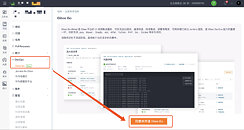Raevenlord
News Editor
- Joined
- Aug 12, 2016
- Messages
- 3,755 (1.21/day)
- Location
- Portugal
| System Name | The Ryzening |
|---|---|
| Processor | AMD Ryzen 9 5900X |
| Motherboard | MSI X570 MAG TOMAHAWK |
| Cooling | Lian Li Galahad 360mm AIO |
| Memory | 32 GB G.Skill Trident Z F4-3733 (4x 8 GB) |
| Video Card(s) | Gigabyte RTX 3070 Ti |
| Storage | Boot: Transcend MTE220S 2TB, Kintson A2000 1TB, Seagate Firewolf Pro 14 TB |
| Display(s) | Acer Nitro VG270UP (1440p 144 Hz IPS) |
| Case | Lian Li O11DX Dynamic White |
| Audio Device(s) | iFi Audio Zen DAC |
| Power Supply | Seasonic Focus+ 750 W |
| Mouse | Cooler Master Masterkeys Lite L |
| Keyboard | Cooler Master Masterkeys Lite L |
| Software | Windows 10 x64 |
GitHub serves as a repository for collaborative work in software development, with numerous open-source projects available and worked on by numerous coders, would-be coders, and others. It has been a paragon for a more open internet, with more open standards, and allowing for actual community-based troubleshoot and development. And it does so for anyone around the world.
However, China's efforts to decouple from its dependencies on the Western world for anything technologically-related has been a reason for the country to invest not only on infrastructure and silicon manufacturing, but also in programming and all of the related branches of the technology tree. Recent events initiated by Microsoft (which now owns GitHub) via severing connections to its GitHub repositories for various US-sanctioned countries such as Iran, Syria and Crimea clearly showed what dependencies on foreign-guaranteed resources can do to technological development. China wants to have an answer to that.

it's now been made public that the country is hoping for its seven-year-old Gitee to become a GitHub equivalent for the Eastern world. This lines up nicely with China's apparent enforcement of a GitHub ban way back in 2013. The goal of Gitee thus stands to construct an "independent, open-source code hosting platform for China." Gitee claims to have hosted over 10 million open-source repositories and provided services to over 5 million developers so far in its seven-year run. For comparison, GitHub reported having 100 million repositories and around 31 million developers worldwide last November.
"If China does not have its own open-source community to maintain and manage source codes, our domestic software industry will be very vulnerable to uncontrollable factors," said Huawei executive Wang Chenglu at an event last August, shortly after GitHub acted to comply with U.S. sanctions laws. And doesn't Huawei know all about being exposed to uncontrollable factors.
View at TechPowerUp Main Site
However, China's efforts to decouple from its dependencies on the Western world for anything technologically-related has been a reason for the country to invest not only on infrastructure and silicon manufacturing, but also in programming and all of the related branches of the technology tree. Recent events initiated by Microsoft (which now owns GitHub) via severing connections to its GitHub repositories for various US-sanctioned countries such as Iran, Syria and Crimea clearly showed what dependencies on foreign-guaranteed resources can do to technological development. China wants to have an answer to that.

it's now been made public that the country is hoping for its seven-year-old Gitee to become a GitHub equivalent for the Eastern world. This lines up nicely with China's apparent enforcement of a GitHub ban way back in 2013. The goal of Gitee thus stands to construct an "independent, open-source code hosting platform for China." Gitee claims to have hosted over 10 million open-source repositories and provided services to over 5 million developers so far in its seven-year run. For comparison, GitHub reported having 100 million repositories and around 31 million developers worldwide last November.
"If China does not have its own open-source community to maintain and manage source codes, our domestic software industry will be very vulnerable to uncontrollable factors," said Huawei executive Wang Chenglu at an event last August, shortly after GitHub acted to comply with U.S. sanctions laws. And doesn't Huawei know all about being exposed to uncontrollable factors.
View at TechPowerUp Main Site






